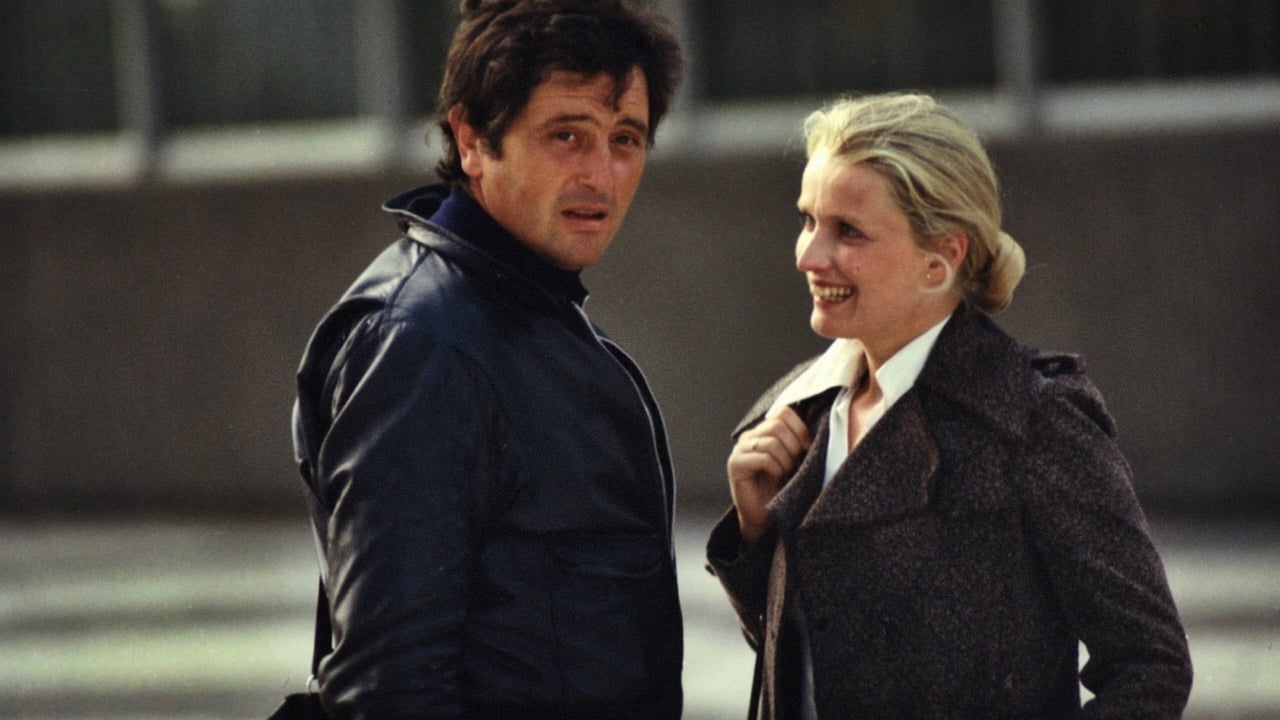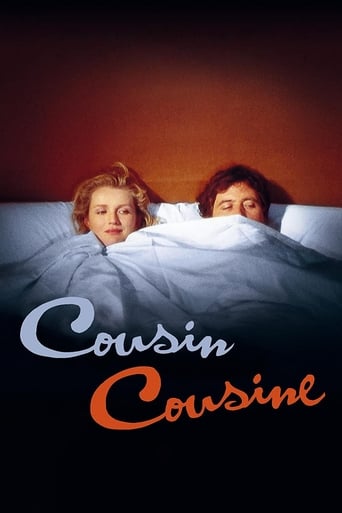



Good concept, poorly executed.
It’s an especially fun movie from a director and cast who are clearly having a good time allowing themselves to let loose.
View MoreThe film was still a fun one that will make you laugh and have you leaving the theater feeling like you just stole something valuable and got away with it.
View MoreThe film's masterful storytelling did its job. The message was clear. No need to overdo.
View MoreCousin, Cousine directed by Jean Charles Tacchella was probably the first French movie I ever watched, at least in French with English subtitles. I was in my first year of college French at Indiana University and this movie was suggested by my teacher, a very enthusiastic grad student and mentor to all of his students. At that time the Midwest was my birthright and I had rarely traveled outside its familiar confines. I knew that I wanted to get away from where I had lived almost my entire life up until then, but I didn't know how to do it or know where to go. I was studying French mostly because it was a required part of an undergraduate degree. I suppose that I just saw it as another course, like economics or history. After watching this movie at an off-campus art house movie theater, I couldn't help but think that the French were very different from the people I knew. At that time, as far as I was concerned, "different" was the same as "good." I immediately developed an overly-romantic view of France that I hold to this day. Cousin, Cousine also gave me an overly-romantic view of love that I have maintained to this day.I just watched this movie again recently, a film that was made in 1975 yet holds up extremely well, both as a timeless work of art and as something capable of speaking directly to me. In some ways I think that I haven't changed a single bit over the course of what has been my adult life. I still think this movie is just about the sexiest thing ever put on film, a story about two people who become best friends before consciously and deliberately deciding to be lovers.I don't even know where to begin as far as my praise for this beautiful film. I love everything about it, even the music remains wonderfully whimsical—a lot of movie scores from the 70s are woefully dated. Cousin, Cousine has soured me on a generation of American films that don't have the slightest clue about how to portray ordinary people. The central characters are a handsome couple but not movie star perfect. They haven't been air-brushed, surgically enhanced, and stair-mastered to within an inch of their lives. All of the characters in this movie have ordinary (if not dumb) jobs. Hollywood's idea of a normal person's job is an advertising executive, and forget about accurately portraying all of the other details of middle class life. I think it was this movie that started my prejudice for books and movies about ordinary people, people I can recognize from my own very ordinary life.If you haven't seen Cousin, Cousine I think you should give it a look, if you can find it. It should only take about the first 15 minutes or so to turn you into a Francophile.
View MoreTwo adult cousins go well beyond the kissing stage in this lighthearted French comedy, a popular choice for the Best Foreign Film Oscar, thanks in large part to its casually forthright attitude toward the joys of physical affection. The two lovers, each already married, are blithely unconcerned with the opinions of others, taking an altogether healthy pleasure in scandalizing their extended (bourgeois) family by retiring to the bedroom for hours on end during holiday reunions, and so forth. A surplus of natural charm, combined with a refreshing (and typically French) lack of romantic melodrama, make it an easy film to enjoy, and an unsurprising candidate for the inevitable glossy Hollywood remake, fourteen years later.
View MoreIf you have a playful sense of humor and enjoy films with an early Fellini (celebration of life-quirky characters) flavor, you should make it a point to watch "Cousin Cousine". Released in 1975, on the surface this is just an off-beat love story about two middle-aged "cousins-by marriage" who are drawn to each other by a shared playfulness. These kindred spirits awaken in each other a zestful and irreverent attitude toward life that distances them from their large (and somewhat strange) extended family. They want to experience as much of life as possible, the man has made it a practice to change professions (not just jobs) every three years so that nothing gets stale. They are very open about their affair, reasoning that the rest of the family will think the worst anyway. Not surprisingly their affair also distances them from their respective spouses, who do not share their fun-loving and irreverent attitudes.The lovers are played by Christine Barrault (nominated for an Oscar) and Victor Lanoux. Although they are fun and likable characters, most of the comedy in this film emanates from the performances of the actors who play their respective spouses. Guy Marchand plays Barrault's husband as a cranky and pathetic Cassanova whose philandering lifestyle is cramped by his inability to cope with his wife's sudden infidelity. Marie-France Pisier, as Lanoux's neurotic airhead wife, subtly steals each scene in which she appears; when a character introduces themselves with the revelation that the only time they have ever been happy was during hypnotherapy, you know that interesting moments are ahead. And for what it is worth Pisier is breathtakingly beautiful.The affair causes the Marchand and Pisier characters a great deal of pain for most of the film, but by the end they have pretty much adjusted to everything. Marchand has resumed his pursue of other women and Pisier has returned to her main source of pleasure-therapy. Marchand's regeneration occurs with his first playful moment, he mounts a knife (fake) in his back and staggers into the living room to the shock of the assembled relatives. While Pisier's regeneration is the best scene of the film. Alone and fully clothed in the bathroom, she half-heartedly tries to slit her wrist with a razor blade and falls backward into the empty tub, which she unexpectedly finds a pleasant and relaxing place to think. And how appropriate since the bathtub is a device we associate with privacy, purgation, relaxation, openness, and regeneration.They say that all films are political and "Cousin Cousine" is no exception. Films have the power to deconstruct the traditional values of society and this love story is also a social commentary on the hypocrisy and double-standards of 1970's western middle class culture. And while pointing out these issues it offers psycho-political messages that each viewer can relate to personally and specifically. The theme is that each day should be a celebration of life, experience, and growth.The grandfather is shown as someone whose long life has given him a real perspective. He is pleased when his teenage granddaughter reveals that she has discovered sex and found it to be wonderful, delighted that she has found something see finds wonderful and amused because her joy is so contrary to the nihilism she had been embracing. He is self-sufficient, the widowed grandmother from the other side of the family enjoys being with him but realizes that he is perfectly comfortable and prefers living alone. He is disturbed by the failure of the family to take any significant time from their lives to mourn his brother's passing.The strange antics of the adults in this extended family are a source of great amusement to the observant children. The carnival music score gives the many extended and flowing group shots a pleasing circus side-show attraction flavor.Note how the film opens with one of families driving to the wedding; parents in the front seat, brother and little sister in the back seat. The parents are agitated and scolding, the children calm and attentive to the experience of the moment. They go out of the scene with the little sister sliding over to be closer to her brother and smiling in adoration. The same little observant girl appears in close-up periodically throughout the film, smiling in amusement at the antics of everyone around her. The film ends with the little girl smiling serenely out the window as she watches the lovers leave on their motorcycle.
View More"Cousin Cousine" had a huge popular success in the United States (as probably everywhere else) when it was released in the 1970s. It is nothing more than a love story about a middle-aged man and woman who are estranged from their respective spouses. They openly profess and privately consummate their love, everybody be damned. The movie's value lies in its anarchic and refreshingly droll (drôle?) spirit. The lovers are the lovely Christine Barrault and her cousin by marriage, Victor Lanoux. They win our sympathy because they are such a delightful contrast to the sham and self-pity of their respective mates, Guy Marchand and Marie-France Pisier. Marchand is an especially hilarious cranky type. Jean-Charles Tacchella directed this bubbly and, yes, "gallic" comedy with wit and sensitivity, and you can't help enjoying it immensely. So all this makes adultery OK? Well, we at least are supposed to think that. The movie was remade in 1989 as "Cousins" with Isabella Rossellini and Ted Danson in the two leading roles.
View More